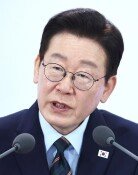Complication of Japans Long-Term Depression & Hatred Toward Foreigners
Complication of Japans Long-Term Depression & Hatred Toward Foreigners
Posted November. 04, 2003 22:44,
Some powerful Japanese politicians are competitively making controversial remarks disparaging peoples of neighboring countries these days, either by considering them as offenders or distorting the past histories.
Whenever these remarks burst out, nearby nations such as Korea and China strongly protests against them, while those reckless, harsh and improper remarks tend to broaden and even become more intense. From recently, not only the steady topic of distorting history but also the overall social affairs also became their issues of a series of cynical remarks.
Professor of Shizuoka Prefecture University, Gohari Sesmu, said, As a reaction of Japans long-term depression, nationalism has been rapidly spreading and Japanese peoples mentality has a tendency to point out foreigners as the origin of domestic problems such as increasing crimes. He analyzed that the disclosure of Japanese kidnapping case by North Korea also made expiatory sentiment thinner towards the Korean Peninsula. Hypochondria due to the long-term depression and hatred toward foreigners, along with the anti-North Korea sentiment, were making a synergy and some politicians made full use of these trends in order to maintain their power, according to the experts.
The irony of a series of victories with reckless remarks on history: We acknowledged that Japan made a big mistake in the past and we seriously reflect on our conduct. However, regardless of Japans continued apologies, the Korean people were never likely to forgive Japan. We felt hopeless whenever it happened like that.
Early this year, a 34-year-old female lawmaker of Japans ruling Liberal Democratic Party Arimura Haruko expressed her uncomfortable feelings, asking, What more can we try in a bid to make two nations get out from the past?
The famous figures that often provoked the remarks of distorting history were mainly some senior politicians in their 60s and 70s. Politicians of the post-generation, right winger as they are, dont make such remarks that are likely to bring troubles with Korea and China.
When someone was involved in a controversy of foolish talks in the past, the involved person apparently took the responsibility to resign from his actual position, but now there are more stories of success. When Rep. Aso Daro quit his job in the party, he was then promoted to become the Japanese General Affairs Minister. Rep. Eto Dakami resigned for the reason of his old age, but eventually succeed to hand over the local constituencies to his elder son.
The power of Ishihara Model: Japans extreme-right leader and governor Ishihara is playing a role as Japanese politician leading a parade of absurd and prejudiced remarks.
Japanese press reported that his popularity owed much to his way of speaking as much as the remarks he made. The majority of Japanese politicians usually turn their remarks round and round and make their intention hard to understand. However, governor Ishihara speak clearly on right and wrong, making him popular, said Makino Yoshihiro, a journalist of politics at Asahi Shimbun.
Kanagawa governor Mazujawa Shigehumi, who considered foreign students including Chinese as petty thieves, turned out to be a reformist politician who was from Japanese politicians elite academic course Matsushita Institute, which is a sensation.
parkwj@donga.com




![[단독]폴란드, 韓 해군 최초 잠수함 ‘장보고함’ 무상 양도 안받기로](https://dimg.donga.com/c/138/175/90/1/wps/NEWS/IMAGE/2026/02/27/133437397.1.jpg)


